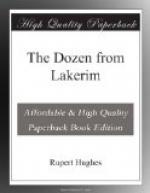The journey to Kingston brought no adventures with it—except that History, of course, had lost his spectacles and his ticket, and had to borrow money of Pretty to keep from being put off the train, and that when they reached Kingston they came near forgetting Sleepy entirely, for he had curled up in a seat, and was reeling off slumber at a faster rate than the train reeled off miles.
The first few days at Kingston were so busily filled with entrance examinations and selection of rooms and the harder selection of room-mates and other furniture that the Dozen saw little of each other, except as they crunched by along the gravel walks of the campus or met for a hasty meal in the dining-hall. This dining-hall, by the way, was managed by an estimable widow named Mrs. Slaughter, and of course the boys called it the “Slaughter-house,” a name not so far from the truth, when one considers the way large, tough roasts of beef and tons of soggy corned beef were massacred by the students.
It might be a good idea to insert here a little snap shot of Kingston Academy. The town itself was a moth-eaten old village that claimed a thousand inhabitants, but could never have mustered that number without counting in all the sleepy horses, mules, cows, and pet dogs that roamed the streets like the rest of the inhabitants. The chief industry of the people of Kingston seemed to be that of selling school-books, mince-pies, and other necessaries of life to the boys at the Academy. The grown young men of the town spent their lives trying to get away to some other cities. The younger youth of the town spent their lives trying to interfere with the pleasures of the Kingston academicians. So there were many of the old-time “town-and-gown” squabbles; and it was well for the health of the Kingston Academy boys that they rarely went around town except in groups of two or three; and it was very bad for the health of any of the town fellows if they happened to be caught within the Academy grounds.
The result of being situated in a half-dead village, which was neither loved nor loving, did not make life at the Academy tame, but quite the opposite; for the boys were forced to find their whole entertainment in the Academy life, and in one another, and the campus was therefore a little republic in itself—a Utopia. Like every other republic, it had its cliques and its struggles, its victories and its defeats, its friendships and its enmities, and everything else that makes life lively and lifelike.
The campus was beautiful enough and large enough to accommodate its citizens handsomely. Its trees were many and tall, venerable old monarchs with foliage like tents for shade and comfort to any little groups that cared to lounge upon the mossy divans beneath. The grounds were spacious enough to furnish not only football and baseball fields and tennis-courts, but meadows where wild flowers grew in the spring, and a little lake where the ice grew in the winter. Miles away—just enough to make a good “Sabbath day’s journey”—was a wonderful region called the “Ledges,” where glaciers had once resided, and left huge boulders, scratched and scarred. As Jumbo put it, it seemed, from the chasms and caves and curious distortions of stone and soil, that “nature must have once had a fit there.”.




